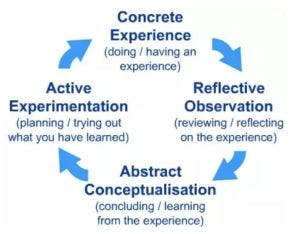Experential Learning

Implementing experiential learning as an employee development method offers a plethora of benefits to the company’s functionality and success.
Experiential Learning Theory
Experiential learning refers to the learning through experience and reflection. In 1984, David Kolb developed the Experiential Learning Theory (fig. 1), describing it as “the process whereby knowledge is created through the transformation of experience.” Following on from this, knowledge is properly formulated when the concept is grasped, fused with transforming the experience. The theory accounts for the effects of internal and external factors, including cognition, environment, emotions and experiences. The analysis and consideration of these factors contributes to the formulation of a holistic approach to understanding experiential learning.

Fig. 1. Kolb’s Experiential Learning Theory (1984) from Simply Psychology.
David Kolb
David Kolb is an American educational theorist whose research and findings focus on experiential learning. He published his learning styles model in 1984, from which he began to develop his inventory. Kolb’s findings encapsulate the individual, career development, and wider education.
Experiential learning benefits
In this article, we will outline five advantageous reasons why experiential learning is beneficial for you and your company.
1. Experential Learning Increases employee engagement
Experiential learning immediately boosts employee training engagement as they are able to interactively participate in the exercises presented to them. Boosted engagement, in turn, results in greater organizational output, thus contributes to the organization’s overall success.
2. Experential Learning Builds employee loyalty
Employee loyalty is built upon when they feel comfortable within the organization and with the content they are learning. In order to consolidate the content, microlearning cements shared information through features such as spaced repetition. When employees are recognised and rewarded, they develop emotional attachment to the company, establishing a strong sense of lasting loyalty.
3. Experential Learning assists in the achievement of organizational goals
Experiential learning connects the training experience to the real world, meaning that employees can start achieving their goals before they start applying their skills to their day-to-day roles.
4. Builds skills applicable to real-life scenarios
Due to the application of real-life skills to digital scenarios provided by microlearning modules, learners are drilled on their current and necessary future capabilities for maximum performance.
5. Experential Learning provides a fun and engaging training experience
The incorporation of gaming elements in microlearning, such as point scores, leader boards, star bars and real prizing, is known as gamification. The technique is used to incentivise employees to increase their learning volume and to enhance information retention. Fun and engaging training breaks down any potential barriers surrounding learners from the absorption of information. From this, learners feel more comfortable and supported allowing them to be more productive and increase performance.
If you would like to learn more about how to build the most effective experiential training strategy!
If you’d like to know more about how EdApp’s mobile learning platform can help your internal training practices, get in touch at enquiries@edapp.com. You can also try EdApp’s Mobile LMS and authoring tool for free by signing up here.
You might be interested in these other articles
– Examples of instructional strategies
– Cognitive Learning Theory
Source
Simply Psychology
Author
Guest Author Daniel Brown
Daniel Brown is a senior technical editor and writer that has worked in the education and technology sectors for two decades. Their background experience includes curriculum development and course book creation.
